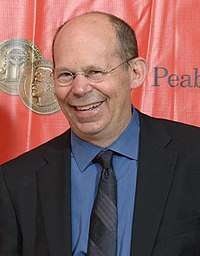Alex Kotlowitz
Alex Kotlowitz is an American journalist, author, and filmmaker. His 1991 book There Are No Children Here was a national bestseller and received the Christopher Award and Helen Bernstein Award. He is a two-time recipient of both the Peabody Award and the Dupont Award for journalism. He co-produced the 2011 documentary The Interrupters, based on his New York Times Magazine article, which received an Independent Spirit Award and Emmy Award.[1][2][3][4]

Biography
Kotlowitz was raised in New York City, the son of former New York public television executive and former Harper's Magazine editor Robert Kotlowitz.[5] Kotlowitz received his undergraduate degree from Wesleyan University and is an alumnus of the Ragdale Foundation. His first journalism job was at a small alternative weekly in Lansing, Michigan. He currently lives with his family just outside Chicago in the suburb of Oak Park.
Writing
Kotlowitz is the author of four books, including the forthcoming "An American Summer." It's received starred pre-publication reviews from Kirkus and Booklist. Pulitzer-prize winner Matthew Desmond calls it "a masterpiece of real-life storytelling." Novelist Luis Urrea writes: "An American Summer is at turns shocking, heartrending, and deeply moving ... This is about the soul of our country." Kirkus called it "A fiercely uncompromising -- and unforgettable -- portrait." Publication is March 5, 2019.
Kotlowitz is also the author of There Are No Children Here: The Story of Two Boys Growing Up in the Other America, The Other Side of the River: A Story of Two Towns, a Death and America's Dilemma and Never a City So Real, among other works. There Are No Children Here, a national bestseller, is the winner of the Carl Sandburg Award, a Christopher Award, and the Helen B. Bernstein Award for Excellence in Journalism.[6] The New York Public Library selected this work as one of the 150 most important books of the twentieth century. In 1993, it was adapted as a television movie produced by and starring Oprah Winfrey. The Other Side of the River received the Heartland Prize for Nonfiction. The New York Times wrote of this book, "A vivid microcosm, a telling tableau of the way we are ... Alex Kotlowitz's nuanced and absorbing account of the mysterious death of a young black man in southwestern Michigan ... is important, essential even, for the rest of us to contemplate." Both books were selected as a New York Times Notable Book of the year. Of Never a City So Real, one critic wrote, "It's a fine successor to Nelson Algren's "Chicago: City on the Make" as a song to our rough-and-tumble, broken-nosed city."
Kotlowitz, a Wall Street Journal staff writer from 1984 to 1993, has contributed to The New York Times Magazine, The New Yorker, and Public Radio International’s This American Life. His articles have also appeared in Granta, The Washington Post, The Chicago Tribune, Rolling Stone, The Atlantic and The New Republic. His work has also been included in numerous anthologies -- and on PBS's Frontline and NPR's All Things Considered and Morning Edition. His 2016 podcast, "Written Inside", was picked as one of the top ten podcasts of the year by NPR's Lauren Ober. His play, An Unobstructed View (co-authored with Amy Drozdowska), premiered in Chicago in June 2005.
About his work, one critic wrote, "Kotlowitz is an omnivorous observer, discerning listener, and unassuming witness to urban life."
He's been awarded honors in all three mediums. His journalism honors include two Peabody Awards, two Columbia duPont Awards, an Emmy, the Robert F. Kennedy Journalism Award and the George Polk Award. He's been a Distinguished Visitor at the John D. and Catherine T. MacArthur Foundation, and is the recipient of John LaFarge Memorial Award for Interracial Justice given by New York's Catholic Interracial Council.
Film
Kotlowitz's documentary The Interrupters, co-produced with filmmaker Steve James, debuted at the Sundance Film Festival in January 2011 to widespread critical acclaim. The project was inspired by Kotlowitz's 2008 New York Times Magazine article, "Blocking the Transmission of Violence."[7][8] For the film, Kotlowitz and James received an Emmy, the Independent Spirit Award for Best Documentary Feature. and a Cinema Eye Award, and was selected by numerous publications, including The New Yorker and Entertainment Weekly, as one of the top ten films of 2011. In 2012, it aired on PBS's Frontline as a two-hour special.
Academia
Kotlowitz is a writer-in-residence at Northwestern University and has been a visiting professor at the University of Notre Dame and at Dartmouth College.[9] He also has been a writer-in-residence at the University of Chicago. He is the recipient of eight honorary degrees.
Bibliography
- There are no children here : the story of two boys growing up in the other America. 1992.
- "Khalid". Granta (108): 47–66. Autumn 2009.
Notes
- "By Robert S. Boynton". The New New Journalism. Retrieved 2011-01-13.
- Tue 5:30 PM (2010-01-26). "PlanIt Purple: 01/26/2010 Reading of Various Works by Alex Kotlowitz". Planitpurple.northwestern.edu. Archived from the original on 2011-07-16. Retrieved 2011-01-13.
- "Run Aground on the Shores of Freedom". washingtonpost.com. 2009-08-02. Retrieved 2011-01-13.
- Bernstein, David. "Alex Kotlowitz News - The New York Times". Topics.nytimes.com. Retrieved 2011-01-13.
- Vitello, Paul (2012-08-28). "Robert Kotlowitz, a Shaper of Channel 13, Dies at 87". The New York Times. ISSN 0362-4331. Retrieved 2018-01-12.
- "UNC-CH Summer Reading Program 1999". Unc.edu. 1999-07-20. Retrieved 2011-01-13.
- Kotlowitz, Alex (2008-05-04). "Blocking the Transmission of Violence". NYTimes.com. Archived from the original on May 18, 2012. Retrieved 2011-02-03.
- Reaves, Jessica (2011-07-30). "Writer Gets New Vision From Film". The New York Times.
- "Prof. teaches writing techniques". TheDartmouth.com. 2010-08-20. Archived from the original on 2010-08-23. Retrieved 2011-01-13.